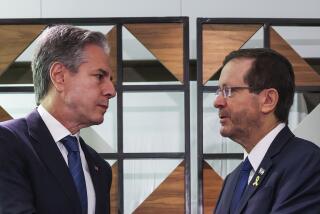Germany Calls On Allies to Back ‘Peace Quartet’
- Share via
BERLIN — German Foreign Minister Joschka Fischer lobbied Russia and other allies Tuesday to back an initiative that would deploy international forces to keep Israeli and Palestinian combatants apart.
In a separate move coordinated with other European states, Germany also imposed stricter controls on delivery of weapons and munitions to Israel to avoid contributing to any escalation of the crisis, a government official said.
The “idea paper” disclosed to German media and discussed with visiting Russian Foreign Minister Igor S. Ivanov proposes salvaging the goals of moribund peace plans forged in Oslo and at Camp David and uniting the diplomatic powers of Washington, Moscow, the European Union and the United Nations.
Although officials at Fischer’s office here cautioned that the “quartet for peace” plan is still in its inception, they confirmed that the emerging blueprint will be ready for presentation at a meeting of EU foreign ministers in Luxembourg on Monday.
“It’s just an idea paper at this stage, but in view of the importance of the Middle East at the moment, it was a logical matter for discussion between Fischer and Ivanov at their meeting today,” Foreign Ministry spokeswoman Antje Leendertse said.
Ivanov accompanied Russian President Vladimir V. Putin on an official visit with Chancellor Gerhard Schroeder for talks on bilateral affairs in the eastern city of Weimar. The two leaders were expected to take up broader security matters such as the Mideast conflict and the U.S.-led campaign against terrorism today.
Neither Fischer nor Ivanov disclosed any details of their discussions. But brief accounts of the draft peace initiative leaked to two leading German newspapers suggested that the first step in a seven-point agenda would be a cease-fire and deployment of a peacekeeping force to ensure “the complete separation of the conflict parties.”
Israeli troops should withdraw immediately from occupied Palestinian territories and remain within the borders of Israel that existed before 1967, Fischer’s plan reportedly stipulates. It also calls for the clearing out of Israeli settlements in the territories and, after an unspecified period of cease-fire, the establishment of a Palestinian state.
Within two years, the Sueddeutsche Zeitung daily of Munich explained, agreements on the future of Jerusalem and permanent borders would be negotiated.
Fischer began work on his initiative because a third party was needed to resolve the sharpening conflict in which neither Israel nor the Palestinian Authority has shown itself capable of finding a solution, the Berlin daily Tagesspiegel said.
Fischer, whose political roots are in the pacifist movements that condemned the Vietnam War and the superpower arms race, has been in close consultation with Secretary of State Colin L. Powell, Ivanov, EU presidency officials from Spain and U.N. Secretary-General Kofi Annan, the Sueddeutsche reported.
Both newspapers likened the quartet of intermediaries to the Balkans Contact Group that was created to deal with the war in Bosnia-Herzegovina, which began 10 years ago and dragged on until the Dayton, Ohio, peace accords took effect nearly four years later. That intervention effort also pooled the resources of the transatlantic allies.
Schroeder also weighed in Tuesday to push a European initiative to halt Mideast fighting, telling the daily Frankfurter Allgemeine Zeitung that peace could be achieved in the region only through “external pressure.” He also spoke in favor of international military engagement. “If there is a chance for peace, then the U.N. will have to think about this, and not just about observers,” he told the newspaper.
Fischer’s proposal echoes recent U.N. Security Council resolutions, the Berlin daily noted, warning that states that “continue to support terrorism or shelter terrorist organizations or their members will be politically and economically isolated.”
Germany’s foreign and economic development ministries declined to confirm or deny reports in Israeli media that Germany, France and Britain have agreed to halt exports of weapons or spare parts for Israeli tanks and armored vehicles. But one government official, speaking on condition of anonymity, said Berlin is “examining on a case-by-case basis” any commercial deliveries to the region to prevent escalation. No materiel has been delivered to Israel in recent weeks, he said, but he declined to call the export delays an “embargo.”
In a dispatch from Jerusalem, the German news agency Deutsche Presse-Agentur reported that Israeli Defense Minister Binyamin Ben-Eliezer has written to Fischer to protest delays in the delivery of spare parts to the Israel Defense Forces. It quoted Israeli media reports as saying that Ben-Eliezer had told German officials to bear in mind their country’s Nazi past in weighing changes to its trade and foreign policy.
More to Read
Sign up for Essential California
The most important California stories and recommendations in your inbox every morning.
You may occasionally receive promotional content from the Los Angeles Times.











